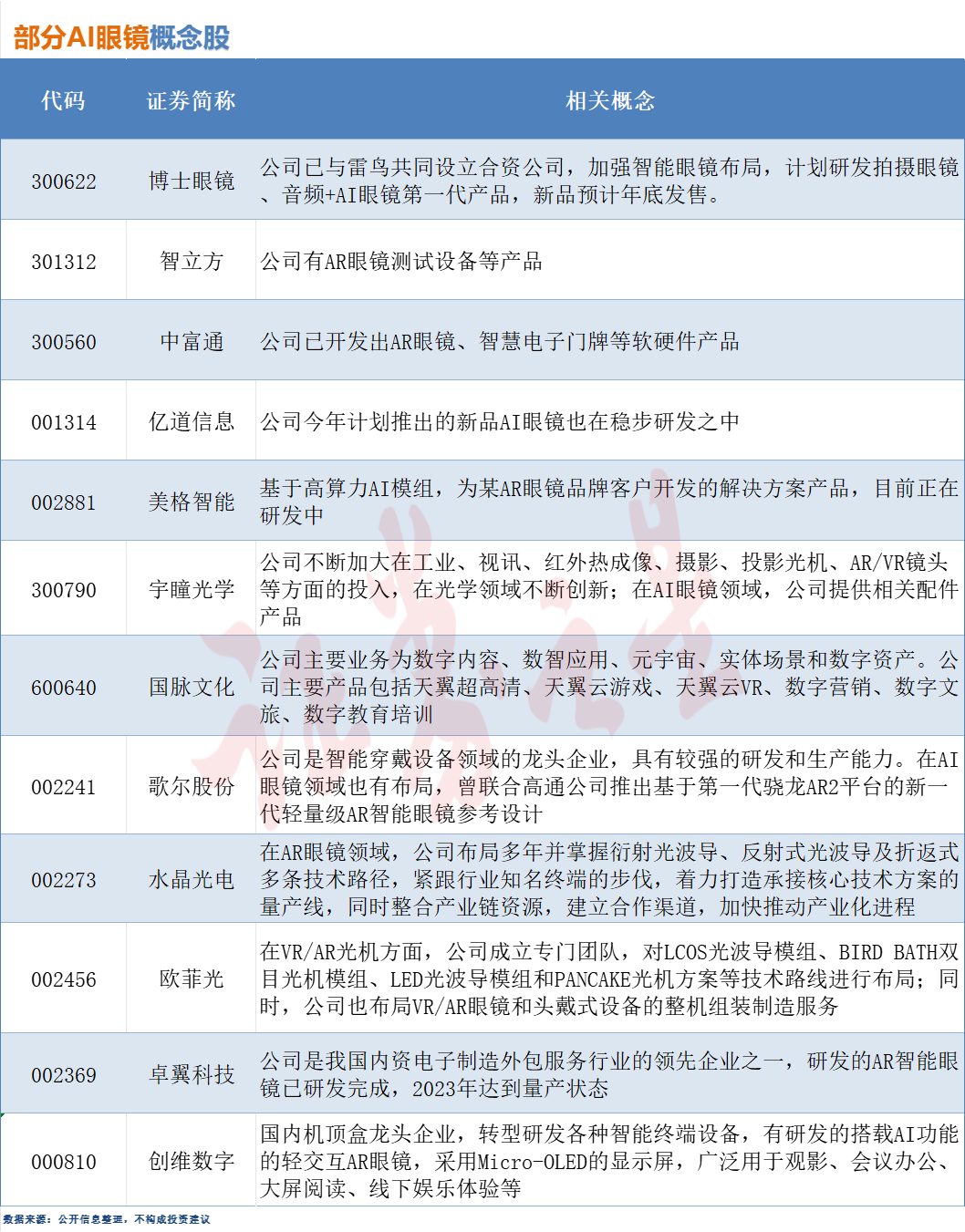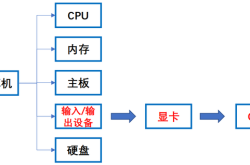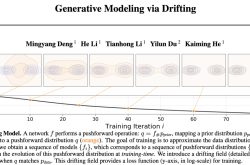AI Glasses See Positive Prospects! Related Concept Stocks Overview (with List)
![]() 11/18 2024
11/18 2024
![]() 736
736
In recent years, as a new blue ocean in the smart wearable market, AI glasses have attracted the attention and layout of an increasing number of domestic and foreign enterprises due to their unique interactive methods, diverse application scenarios, and broad market prospects.
Recently, Baidu released its first pair of glasses, Baidu AI Glasses, and called it the "world's first native AI glasses equipped with a large Chinese language model." It is revealed that Baidu AI Glasses will officially go on sale in the first half of 2025.
Upon hearing this news, keen investors have flocked to platforms like Hudongyi to inquire about "AI" and "blockchain." Will AI glasses replace VR glasses as the next hit product in the consumer electronics industry?
01. Multiple Companies Enter the AI Glasses Market
In fact, AI glasses are not a new product in 2024, but they have been frequently mentioned in the market in 2024 and are highly anticipated with great expectations. It is widely believed in the market that AI glasses are considered one of the best carriers of AI.
According to IDC data, the global smart glasses market size has continuously grown from $1.826 billion in 2018 to $5.031 billion in 2021, with a CAGR of 28.84%. From 2021 to 2023, market growth was under pressure, but in 2024, it is expected to resume positive growth due to the successive launch of multiple new head-mounted devices such as Apple Vision Pro. It is projected that from 2024 to 2028, with the increase in consumer application scenarios, the global smart glasses industry will further accelerate its growth, presenting vast potential.
Currently, one of the key factors driving many global tech giants to invest more in AI glasses may be the success of Meta's hit product, which has opened up new opportunities. In September 2021, Meta and Ray-Ban jointly released the first generation of smart glasses, but the response was not good. However, despite the market feedback, it did not affect the cooperation between the two.
Last September, at the Meta Connect conference, Meta continued its collaboration with Ray-Ban to launch a new Ray-Ban Meta smart glasses model. In terms of appearance, the Ray-Ban Meta smart glasses feature a sturdy sunglass design and are available in blue, black, and brown. LED indicators and cameras are placed on both corners of the glasses.
This year, domestic tech giants have also been competing to release new products, but no "hit" products have emerged yet. In mid-April this year, Xiaomi's Mijia Smart Audio Glasses Enjoy version was officially launched; in May, Huawei released smart glasses equipped with the HarmonyOS 4 operating system and integrated with the Pangu AI large model; in August, Hive Tech launched the Jiehuan AI Audio Glasses.
Rokid will also hold the Rokid Jungle 2024 Partner and New Product Launch Conference in Hangzhou on November 18, introducing a new generation of AR glasses and new insights into the AR industry.
02. AI Glasses Are Expected to Take Off
Currently, with more and more tech giants entering the market, the domestic AI glasses market is expected to usher in a period of major new product launches in the near future. Currently, many listed companies in China are deploying upstream and downstream of the AI glasses industry chain, and a relatively complete industrial ecosystem has been formed.
In terms of the product supply chain, companies like Crystal Opto-Electronics and Sunny Optical Technology can provide key optical components for AI glasses, such as lenses and optical waveguides; SoC chips from companies like HXSemicon and Rockchip provide computing and processing capabilities for AI glasses; Will Semiconductor stated that its image sensor products' advantages in small size and low power consumption are highly compatible with the needs of AI glasses and other end-customers.
In the manufacturing process, companies like GoerTek, Luxshare Precision, and Huaqin Technology have become important manufacturers of smart glasses due to their strong capabilities in complete machine assembly.
In terms of traditional glasses manufacturers, companies like Boshen Optical have established collaborations with AI glasses brands in the industry to expand product sales channels and provide high-quality after-sales services. For example, in July, Boshen Optical launched Li Weike MetaLens Chat AI glasses offline at 50 stores nationwide; in the same month, Xingji Meizu and Boshen Optical jointly announced that MYVU AR smart glasses would be available at Hainan Duty-Free Shops for the first time.

It is not difficult to find that among the current A-share industrial chain companies, AI glasses have not yet formed a significant business contribution. CITIC Securities' research report points out that "in terms of short-term investment, due to the fact that AI smart glasses shipments are only in the millions, corresponding to low performance elasticity for domestic suppliers, it is more inclined towards thematic investment."
Regarding the development prospects of the AI glasses industry, Dongwu Securities released a research report stating that with the rapid development of multimodal AI, AR glasses empowered by AI can not only greatly enhance interactive capabilities, making them more intelligent and user-friendly, but also expand the application scenarios of AR glasses. The success of Ray-Ban Meta proves the feasibility of AI glasses products as AI terminal landing scenarios. In the future, with the accelerated layout of industry giants and the promotion of supply chain cost reduction and efficiency enhancement, the AI+AR glasses industry is expected to develop rapidly.
China Merchants Securities stated that it focuses on the investment strategy of the consumer electronics sector with product structural innovation and terminal innovation empowered by AI. It analyzes from three aspects: demand recovery, structural innovation, and terminal innovation, with a focus on mobile phones, PCs, and the XR field.








